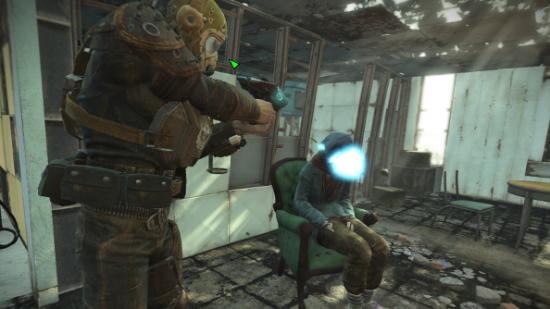Fallout 4 has proved to be an improvement on both Fallout 3 and New Vegas in countless ways, from the addition of the surprisingly compelling settlement construction to the diversity of the gloriously silly and disturbingly grim Boston wasteland. One thing has stubbornly refused to improve, however, and arguably is a significant step back, and that’s the story. New Vegas is still the Fallout with the strongest narrative chops, I’m afraid.
It is, perhaps, strange for me to espouse the merits of New Vegas’ plot. I’m a man who can often be found in dark corners ranting about how lacking in ambition videogame narratives are, but here I am, putting a simple ‘amnesiac seeks vengeance’ tale on a pedestal. It’s the premise that feels most appropriate for the the wastelands of Fallout’s vintage-future world, however, a setting that’s tragic, but also peculiarly optimistic, where a person can effectively die, come back, hunt down their killers, or maybe just ignore it all and befriend a super mutant.
Really, though, I might just feel this way because I love being evil.
While you’re reading about Fallout, why not check out our Fallout 4 PC review.
NB: Minor story spoilers for all Fallout games follow.
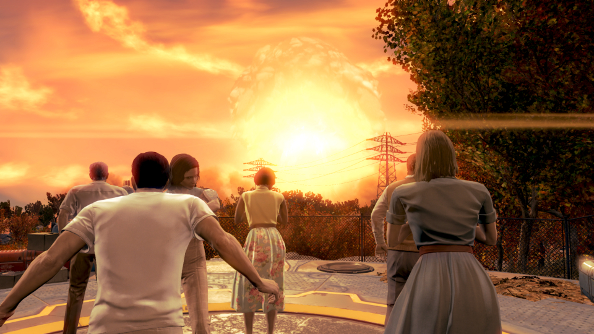
The world of Fallout is a harsh, unforgiving place, rife with bandits, slavers and drug pushers. Look past the jokes and the satire and it’s a relentlessly macabre world where monsters store trash inside blood-smeared flesh pods and wealthy men hire wanderers to set off nukes in town centres. And the games embrace this, letting you join the ranks of the worst kinds of people, eat human flesh and even sell companions into slavery.
There are few games that let you be so bad, let alone ones that almost encourage it.
Yet the Fallouts have typically been games that put you in the shoes of a saviour. The original Fallout sees the protagonist set out to find a water chip and save their vault and its sequel starts off similarly, giving players a mission to find a Garden of Eden Creation Kit in an effort to save their tribe. Fallout 3 shake things up a bit by forcing players out of their vault after a riot, but that kicks off a game-spanning quest to look for Liam Neeson dear old dad, a water-obsessed scientist. So once again, the narrative pushes players into being the type of person who would care about doing good, even if that person is also a drug-addled cannibal.
Then we get to New Vegas. As an unlucky courier, players are shot in the head for reasons that aren’t clear at the time, survive and then go on a mission to hunt down their would-be-killer. It doesn’t get much more straightforward than that, and for Fallout, it’s a perfect beginning. Your past is simply that you were someone who got screwed over. The quest, then, is a primal one, either the need for revenge or the need for answers. There’s no need for suspension of disbelief, because a goody two-shoes is just as likely to want to search for the man who attempted to murder them as a loopy maneater.
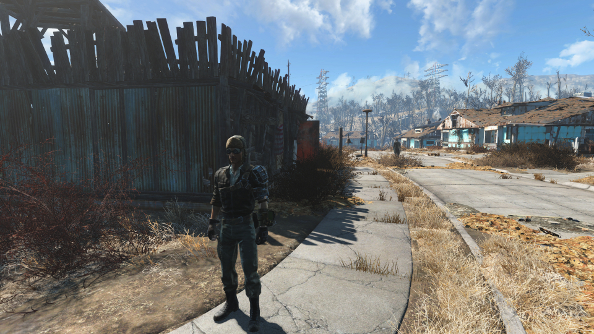
When a game lets you do just about anything, it’s the story’s job to get it to make sense. Take Baldur’s Gate, for instance: The Bhaalspawn’s quest is, much like the courier’s in New Vegas, a revenge tale or a quest for answers, letting the player choose how to frame it depending on the alignment they selected or just based on their own roleplayed motivation. At no point does New Vegas or Baldur’s Gate make it feel like you’re being forced down a specific path. You play the ultimate tabula rasa, a person with no background and the potential for anything. In comparison, Fallout 4’s story just gets in the way.
The problem isn’t even that you’re searching for your missing son. Even evil people have kids, and they’d probably be miffed if their offspring was kidnapped as well. The issue is that, right out of the box, you’re playing a caring mum or dad, and a loving husband or wife. It goes one step further, even, giving you a perfect life with a white picket fence and not a care in the world, aside from the impending apocalypse. Even your pre-apocalypse career is decided for you, making you an army veteran whose service to their country netted them a family ticket for Vault 111.
It’s the opposite of a blank slate.
After the prologue, you’re free to be as damaged and evil, or as good and friendly, as you want. But your origins and the main quest make it all very awkward. Not just because the sappy hunt for the fruit of your loins forces you into the role of concerned parent, but because the urgency of finding a lost baby is weirdly juxtaposed to tens of hours of building villages, picking flowers, joining a bunch of factions and storming towers of super mutants because you heard something on the radio.
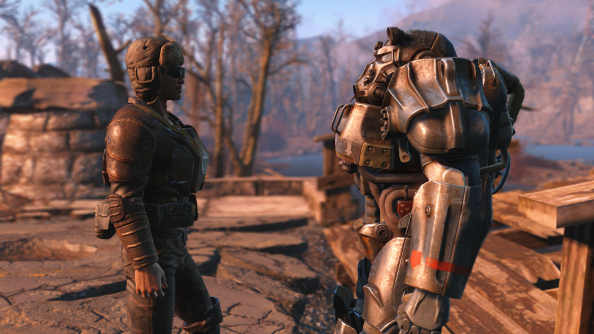
I haven’t touched the main questline in at least 15 hours, probably a couple of weeks of in-game time at least, which sort of flies in the face of the implication that I will do anything I can to find my son. I obviously won’t. But eventually, I will have to, or I won’t be able to finish the game.
Worse, outside of the main story, I’ve become a hero by mistake. I’d hardly done anything at all, let alone anything noble, before being made General of the Minutemen, a group of do-gooders who look out for the little guy. I’m reminded of the moment when I discovered that Lando ‘Smooth Talker’ Calrissian was made a General of the Rebel Alliance after only just almost getting three of the Alliance’s biggest heroes killed.
It’s just as bad with the Brotherhood of Steel. I helped one of them out, Paladin Danse, in the hopes of getting a fancy, high-tech reward, and *boom*, I’m being offered yet another job. Later, Danse essentially admits that he’s in love with me and that I’m basically the perfect Brotherhood Knight. The entire time I’ve been with him, I’ve been sarcastic, I’ve made fun of the Brotherhood, and I shot one of his buddies in the arm.
Thankfully, you can choose to decline these offers of employment, but the fact that they’d offer these jobs and go on about how awesome and noble I was so damn quickly utterly breaks the illusion that I’m some wasteland badass who might eat your mum if he was hungry enough. And it has had a massive, and I think negative, impact on the way I’ve been playing the game.
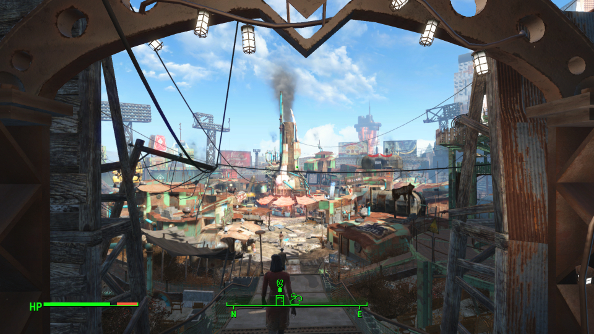
In contrast, Fallout: New Vegas lets you side with a bunch of escaped criminals and take over a peaceful village five minutes in. And not long after, it introduces the murderous Caesar’s Legion and lets you help them out after they’ve killed and crucified an entire town. This is all within the first hour or so. One hour into Fallout 4 and I was freaking out about my lost son and saving people from raiders.
There isn’t a Fallout game I haven’t played twice. And, always, I play a villain first time around. It’s usually easier, because evil people seem to get richer quicker in RPGs, and it’s fun because I’m getting to make choices that I’d never in a million years make out here in the real world, where I’ve never considered a meal of long pig. In Fallout 4, I’ve deviated. I started off bad, but my villainous acts were either ignored, or they just felt weirdly out of character.
Companions tend to favour characters on the side of angels, as well. Out of the 12 potential companions, only a couple are really tolerant of villainous behaviour, and your dog, Dogmeat, doesn’t really care either way, but given how adorable he is, if he wasn’t a dog, he’d probably have issues with murder and mayhem. This is particularly frustrating because companion affinity has replaced the karma and faction systems from earlier Fallouts.
Instead of generating reputation with the whole world or a multitude of factions, Fallout 4 barely recognises player morality at all. Doing certain quests for specific factions cuts off future quests with others, but beyond that, the only thing that matters is what your allies think of you. And it’s all a bit arbitrary. For instance, a good companion might not be a fan of you eating people, but if you do something they like, putting on some Power Armor, for instance, then that will eventually repair the damage. This does mean, however, that it’s extremely frustrating to get through an evil playthrough, because you’ll constantly be upsetting your companions, requiring you to go through the stupid motions to win back their favour, which isn’t exactly something a care-free serial killer is going to do.
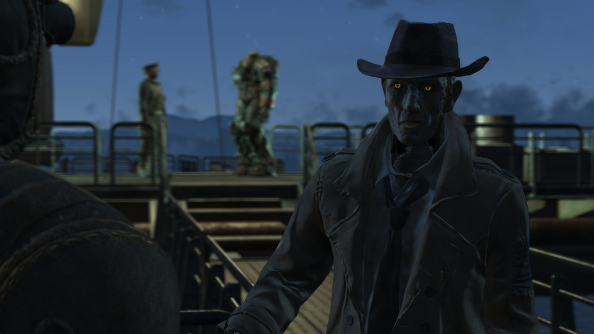
New Vegas’ companions were, admittedly, mostly ‘good guys’, as well, but New Vegas also had faction reputation that determined how the rest of the Mojave wasteland viewed you, and they at least accepted all of the heinous acts you might want to commit. And their motivations didn’t get in the way, either. Fallout 4’s cast, on the other hand, mostly make their motivations clear from the outset, and the ones you meet first are all positive and hopeful.
There’s Piper and her journalistic search for truth and justice, Paladin Danse’s desire to save people from the perils of ancient technology, Garvey’s quest to rebuild the wasteland and protect people, Nick Valentine’s quest to solve crimes and help you find your son, Strong’s hunt for the ‘milk of human kindness’ – they’re all just so damn nice. It’s exhausting.
Many of these issues have cropped up in other games that purport to allow you to be whoever you want to be, true, but Fallout 4 manages to bundle in every obstacle that it can fit while still, technically, letting you do what you want. I feel like I’m playing a game with my parents looking over my shoulder. I can already hear my mum sighing.
“Well, Fraser, we know you’re 30 now, and we can’t make you do anything, but wouldn’t it be better to not eat that family of farmers? How about you help them out with their ghoul problem instead? We won’t be mad if you ignore us, but we will be disappointed.”
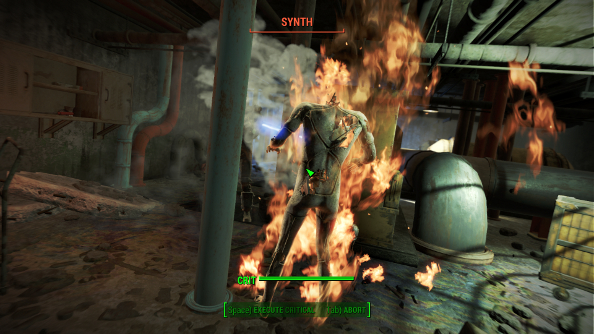
That said, dear old mum would probably be disappointed regardless. Fallout 4, despite constantly pressuring you into being good, also forces you to kill a lot of people. If you meet someone out in the wasteland, chances are they’ll try to kill you. And then it’s kill or be killed. And there are so rarely conversations beforehand or ways to try and defuse the situation. Most human life in Fallout 4 simply wants to kill you and serves to give you XP when you end up killing them. An early encounter with a drug pusher strong arming a woman into paying her son’s debt gave me some hope, as words saved the day in that instance. I’ve only seen something similar once since then, in over 30 hours.
Isn’t that very peculiar? In a game about rescuing your son and resurrecting Boston, the main way you interact with people is by shooting them with bullets that somehow decapitate them. So there’s no escaping this bizarre disconnect between the story and gameplay. If you’re an evil bastard, then nothing is going to feel right, and if you’re a generous, charitable hero, then you’re going to be forced into slaughtering hundreds, if not thousands of people and probably feel a bit ambivalent about the whole fiasco.
Despite this, I’m thoroughly enjoying Fallout 4. I’ve probably put more hours into it in this short space of time than I have with any game I wasn’t reviewing in 2015. Indeed, since its launch a few days ago, I’ve only taken breaks to watch The Apprentice, eat and work. But I’ve really had to make a serious effort, changing how I played entirely, to become immersed in the world and comfortable with my character. It shouldn’t be this tough. And even after the personality transplant, I’m still finding myself struggling, because nothing about my character or his motivations make a lick of sense.
